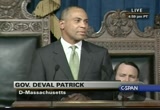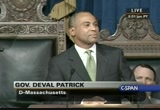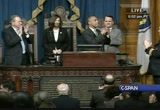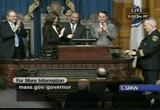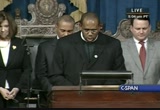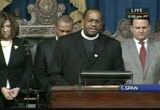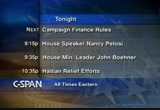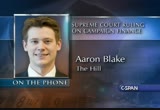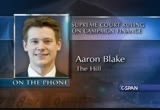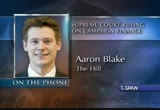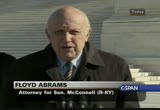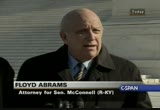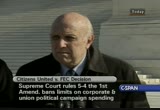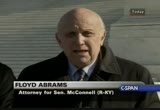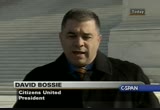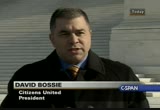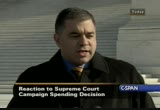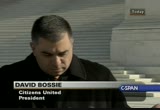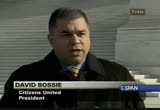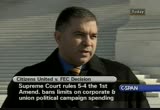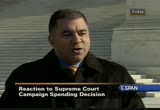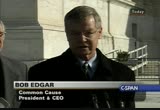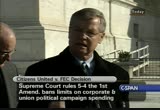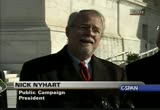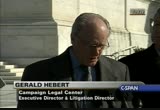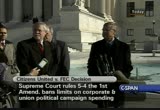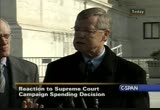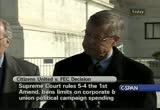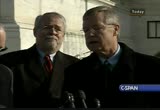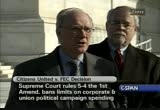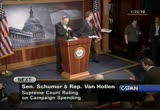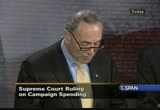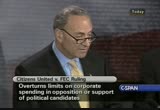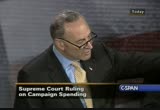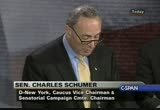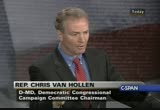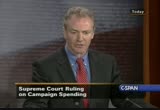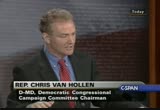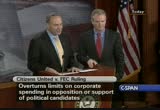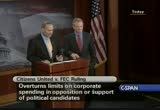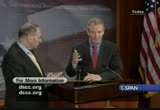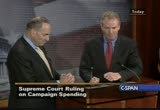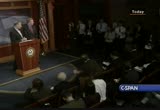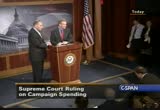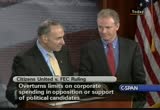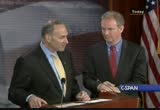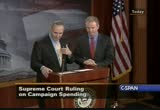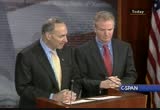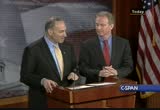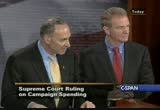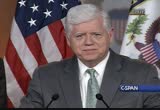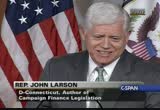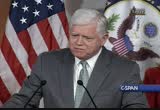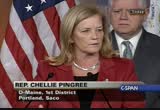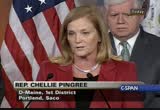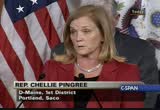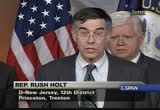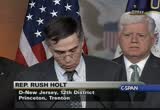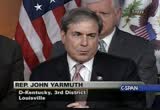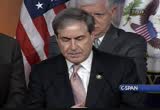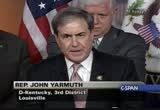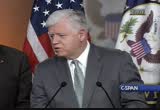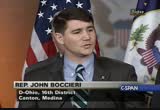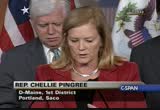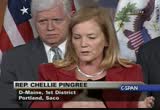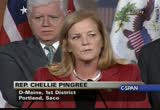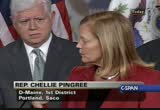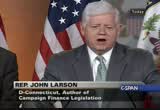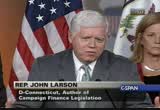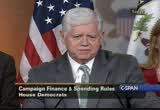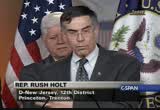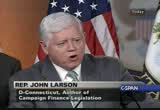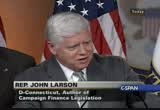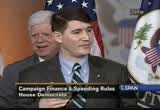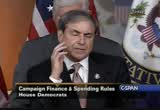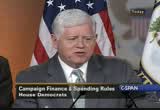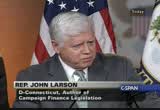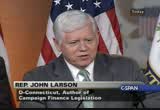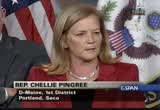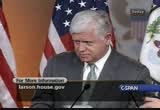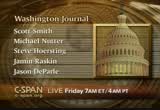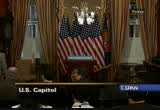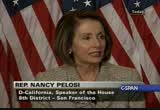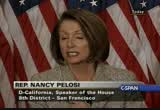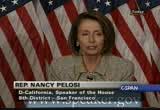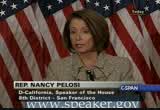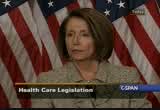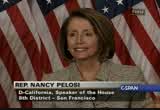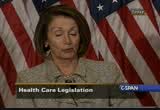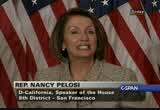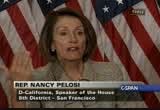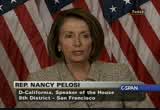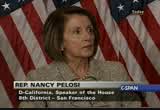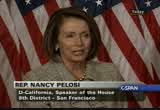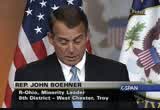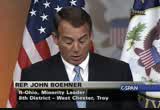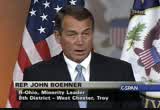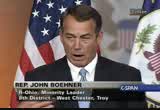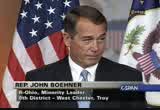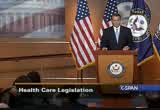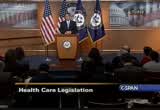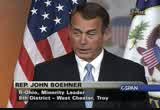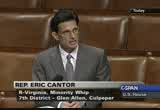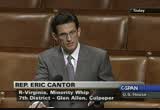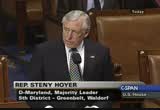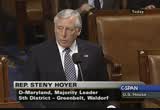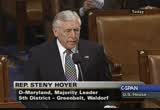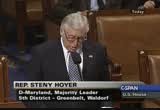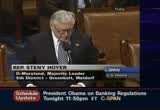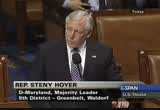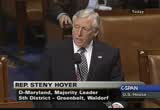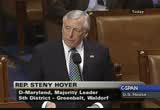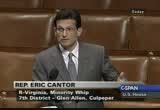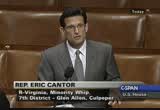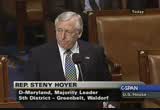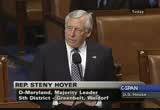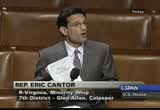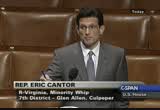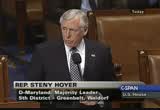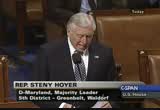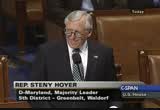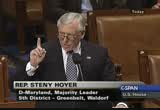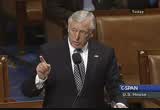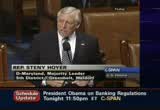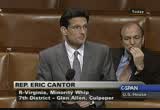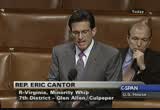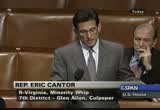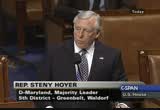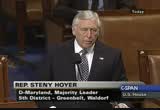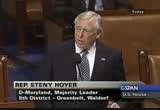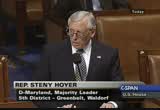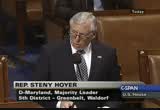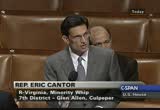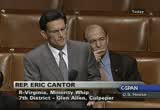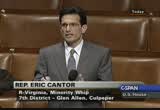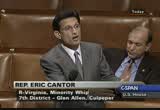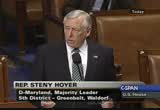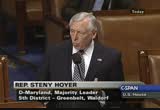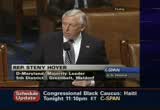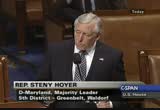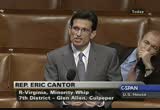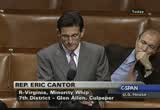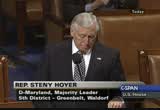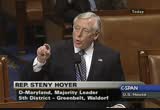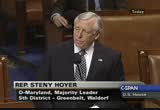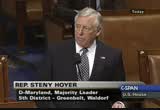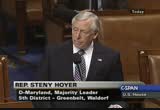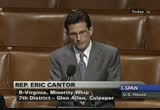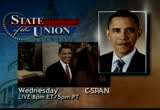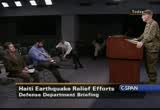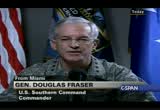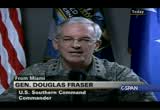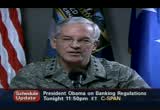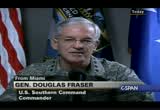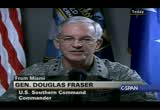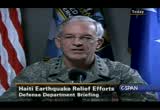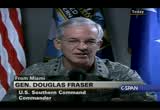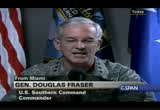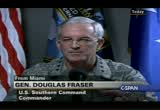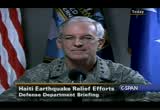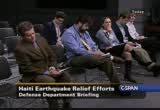tv Tonight From Washington CSPAN January 21, 2010 8:00pm-11:00pm EST
8:00 pm
8:01 pm
8:02 pm
8:03 pm
8:04 pm
good and great, how blessed we have been to have gathered once again in the solemn chamber. you have both honored and yet humbled us by making known through our government the extraordinary challenges that face this commonwealth. but you have given us hope and also knowing that in your name, through your power, for your sake, we can meet and overcome the challenges that lie ahead. how thankful we are for your service and our governor,, mayor deval patrick, -- governor deval
8:05 pm
patrick, encourage him and trust in him to always govern and with kindness and compassion. we look to you to touch the heart of every state officer, every state representative, every state senator, and every locally elected official to labor with our governor and leading us through these difficult days ahead. it is on to you and you alone, the god of our governor, the board of this legislature, and the creator and ceasing of this commonwealth said the answer that believe this place both renewed and ready to fill your word and it is in that name,
8:06 pm
your name, the only name that rains above all, that we can all declared together, amen. >> tonight, reaction to the supreme court ruling today striking down many restrictions on corporate campaign finance rules. nancy pelosi talks about the status of health care legislation and we will have an update on haitian relief efforts from the pentagon and members of the congressional black caucus. " the supreme court handed down a landmark ruling on campaign finance laws. and a 5-4 decision, the court ruled against a regulation that limits corporate spending on
8:07 pm
political activities. you can listen to oral arguments and read the majority and dissenting opinion on our website, c-span.org. we asked a reporter for details about the ruling. >> to a guses aaron blake of the hill newspaper. is this ruling a major change? >> i did not think there is any other way to read this white now. the initial reaction was that it was a split decision. this opens the floodgate for corporations to spend money like individuals can and the politics wrong irina. that was the big take away. we are waiting to see what finer details of it are. right now, it looks like a lot more money into politics that includes for corporations. depending on where you are standing, that is good or bad. >> which are existing politicians saying about the existing mccain-feingold loss?
8:08 pm
>> the main thing was that it took away the limits on how much these corporations could spend and it also allows them to spend the money not just from their political action committees but from their general treasuries which breaks down a barrier between the corporate side in the political action side of a lot of these corporations. >> you write about the court striking down the distinction between individual and corporate expenses from a constitutional standpoint. why is that significant? >> once somebody becomes a corporation, they do not leave their political speech or freedom behind. the difference was that individuals were allowed to say whatever they wanted but corporations were not put it was created that way because
8:09 pm
congress did not want the appearance or actual corruption to take place. the court ruled in this decision that and limited spending by corporations did not necessarily lead to corruption or the appearance of it. that is the key point here and one that many future cases are going to look back on. >> if you used the term floodgate. what do you think this means in terms of spending for this year? >> in 2012, it is going to be the big one. there is going to be a lot of legislating and legal battles over this decision. this is just sort of a framework for right now. people are likely working very hard for now on this. we do not know exactly where the increase in corporate and union money in elections will come. that is what we can expect as an increase as this goes along. >> aaron blake. you can read his work at
8:10 pm
htehill.com. >> attorneys that argue both sides of this case reacted to the court decision. this is 20 minutes. >> as one of the lawyers that targeted in the supreme court. -- that argued it in the supreme court " >> this is a triumphant day for the first amendment. the court has ruled that corporations, unions, and all the rest of us, may participate freely and openly and spend money on electoral and political matters. this decision is a long time in coming. as the opinion of justice kennedy makes clear, it involves the reversal of two prior opinions. one involving senator
8:11 pm
mcconnell, and one a few years before. the core of it all is the right to participate and speak out about, to be heard about matters political, social, and the like, is one in which the public at large has an interest in. there is a listener, a viewer, a reader, interest in political views the, orientation and the like which the first amendment protection. that applies to corporations as well as individuals as justice kennedy pointed out. this is say significant protection for media corporations as well as all other corporations. there is no way that the court is going to treat media entities and no different every kid any
8:12 pm
differently than anybody else. corporations either have rights or cannot have rights. whoever has them, and the decision says today and firmly and unequivocally that corporations and individuals have the right to participate in the political process. this is a triumphant day in terms of the first amendment. we really have no idea at and on the ground level of how big a change this will be. 26 states now allow unlimited corporate expenditures and contributions and there has been no brought sweeping change and the politics in those states. it is possible that this may be more of an illogically
8:13 pm
significant day than a -- a logical etiologic -- ideological rolling than a practical one. that is what the first amendment is about. if you really mean the speech is a good thing and you believed that the public should have a chance to make up their own minds, there is no reason to limit the class or category of people or institutions who may be heard. thank you very much. >> of and the president of citizens united.
8:14 pm
i am extremely excited and humbled by today's ruling and the supreme court. this has been a long road for us. this is a monumental date for citizens united, for our board of directors who have had this occurred to support me and for members who have supported us over the years. we have been working on the theory of this case since 2004. the last year has been at the supreme court. it took a lot to get to this point. it is a monumental day for citizens united and more importantly, for the first amendment. also, the fundamental rights of people to participate in the political process. whether you are an individual or a corporation or a union, it
8:15 pm
does not matter. you cannot participate fully and freely in the election process. that is an important thing. we worked three hard over the years to try to talk directly to the american people. i think the american people are smarter than politicians give them credit for. when politicians and the incumbent class tries to protect themselves by passing laws that make it more difficult for people and for organizations to participate in the process and for people around the country to stand up and speak, it is an amazing thing. i think the election on tuesday shows that the voters are smarter than politicians give them credit for. i am really excited about today.
8:16 pm
i want to take this opportunity to thank a few people. there are people that are not here today and i am heartbroken that there are not. they are at a trial right now and could not make it. i am heartbroken that they are not here. they mean more to me then they know. for them to have put this case at the forefront of everything they're doing and pour their hearts and souls into this case, it is incredibly humbling. a dear friend these people have been to me. where have known each other a long time. -- we have known each other a long time. for him to argue this case twice for us means a lot.
8:17 pm
our vice-president and general counsel, who held this case hand for the last several years all the way up through its inception when i walked into this -- to his office and gave him the concept of the case and believed in it and believe in what we were trying to do and now today, the culmination of that. sometimes we do not know what is good for us. having each member of the team are doing the case at oral arguments was a tremendous honor for us and brought a lot to the table. having senator mcconnell be a part of this case was a terrific plus for us.
8:18 pm
my co-executive producer on the film. there are tremendous supporters of citizens united. they have been friends for many years. i cannot thank him enough for standing by me through this case and film. our first lawyer that helped us get to the supreme court. he is one of the foremost first amendment lawyers in the country. most importantly, the members of our organization. the over half a million supporters whoso portis each day. our board of directors, it is an incredible honor. and of course, my family. my father is here. it is a great victory for us. it has been agonizing for the past few days, or actually a few
8:19 pm
months. we were waiting and waiting and waiting. what is amazing is that we lived through this for years and to be told by the bureaucrats that we cannot do this. you have no first amendment rights. i think today is a wonderful day to tell the people at the federal election committee that the work for the people. the people to not work for them. i am honored with this outcome. it is a tremendous victory for the first amendment and for our organization. thank you very much. >> i am happy to take any questions. >> what you say about first amendment rights for corporations having the same rights as people? >> we will have a chance to read the opinion.
8:20 pm
i cannot know exactly what the opinion says just yet. it is a great day for every person in america. whether you own stock, run a mom-and-pop grocers stored. when we took in those contributions, they were just like that. they were from individuals, restaurants, liquor stores, dry cleaners. people who incorporate for the protections because of the litigious nature of this country. what we tried to do with speak for them. they have no lesser voice than an individual. many corporations in this country are individuals. thank you. >> i and the president of common
8:21 pm
cause and i am here with some colleagues who think that rick is is not a triumphant day other than for wall street's and for business interests. i am president of common cause, working with public campaign and public citizen's and a group of people who are outraged by this decision. it is the super bowl of bad decisions. corporations are not individuals. some of them are larger than countries. we need to recognize that money has influenced the debate here in washington for too long. all you have to do is look at the housing crisis, investment crisis, the banking crisis, even this health care debate was already tainted by how much money had flooded into the system. corporations and unions already had the opportunity to put money into campaigns through political
8:22 pm
action committees. they already spent a ton of money. this decision today simply doubles, quadruples, the opportunity for more money to flow in. my guess is that what you're going to discover over the next several years is that the elected officials in the house and senate are going to end up serving special interests even more than they do today and not the public's interest. we need citizen-owned elections. we need average and ordinary citizens to participate. we need voluntary opportunities for people to contribute. our founding fathers never intended that money was going to be included in the free speech amendment. this decision was 5-4. we believe that what the supreme court has done is shown their political activism at a time when they should be thinking about what is important for the
8:23 pm
public and the public interest. my colleagues will also have a comment. >> i am the president of public campaign. fundamentally, the decision is not a victory for the voices of ordinary people. the court has taken the side of wall street and other deep pocket interests and their billions of dollars which now gives them the capacity to drown out ordinary people. we have seen from tuesday postelection in massachusetts that americans are tired of business as usual. this is a triumphant decision at the supreme court for business as usual. if you do not like washington gridlock, if you do not like the voices of ordinary people being tried out, you should be against this decision. the root question is what congress does. while they take steps to increase the impact of ordinary people within the political process where will they stand back. that is their choice. that is up ahead.
8:24 pm
they will either correct this decision or let it stand. we need to see what side they are on. >> i am with the campaign legal center. a few years ago, we defended the bipartisan campaign reform act representing senators mccain and fine gold. -- feingold. today's decision is a disaster for the american people. to us lawyers, it is one of the darkest days in supreme court history. let there be no mistake, today's decision is the most radical and destructive campaign finance decision in the history of the united states supreme court. the mask of judicial restraint is off. john roberts and four other justices who joined his opinion have unleashed a limited amount of corporate money and potentially the money from foreign countries and to our collection process. that can only be a disaster for
8:25 pm
our democracy. hopefully there is room in this decision for congress to fix a lot of what the supreme court did today. make no mistake, today's decision showed a lack of respect for judicial precedent and judicial principle. we are going to do something about it. >> we are going to take your questions. anybody have a question? this is the super bowl of bad decisions. >> what is your understanding of the legislation >? >> our organization has been working on voluntary public financing legislation. we know that the president, while he did not take public funding for the presidential campaign, news that the system was broken. we anticipate that will be a piece of the fix. there will be other
8:26 pm
opportunities once the decision is carefully analyzed and reviewed to figure out how you can look at the decision and work around it. i cannot think until the supreme court changes its mentality, the overrode a previous decision. i am an optimist. to serve in congress, you have to be an optimist. i am optimistic that one day in the future, the supreme court will recognize that corporations are not individuals. corporations should not have unlimited access and perhaps shareholders will rise up and really put pressure on corporations to not simply squandered and dipped into their treasuries and turn that into campaign donations. we hope that the american people will be horrified by this. take a look at the mortgage crisis that we face and the housing crisis.
8:27 pm
it was political contributions under the current system that diluted the regulations that should of been in place to protect the public. now the are in an economic tsunami. the supreme court needs to go back and rethink this. this is a conservative supreme court decision. it is a corporate decision. it is a wall street decision. i think that over time, the american people will be outraged by this. >> one point about the fair elections act. it would magnify the power of small donors. it would stop candidates from taking contributions of more than $100 from anybody. it would take candidates off the campaign fund-raising treadmill and pay attention to their constituents. " what does this look like going forward? the you expect to see more attack ads financed by
8:28 pm
corporations? to you anticipate direct endorsements by corporations? >> the fundamental thing is it will make elections more expensive. when you made the attack, the best defense is to raise even more money. that sends members of congress staring back to get more contributions and find more bundled money. that is the last thing we need. candidate's spending more time. >> it can also mean a row corp. can look -- a rogue corporation can take a congressman they do not like and a district that normally has $500,000 or $1 million spent, they compile and $5 million and recycled elected officials or bring on elected officials who are simply puppets of that corporation rather than
8:29 pm
serving the constituency. i would also add that one effect of today's decision on future decisions -- on future elections is the amount of corporate what they can be spent. take the fortune 100 companies. they have something like $15 trillion in revenue. that is a trillion. several hundred billion dollars in profits. imagine what that type of money can do. if a candidate is running for office, a corporation can spend $15 million for or against that candidate. the set -- bus and it makes sense that that candidate will be beholden to that corporation? it is now the senator from microsoft or from some international corp. on the other side of the world. >> we have some calling cards if you need to get in touch with us.
quote
8:30 pm
there are several press conferences that will be held on the technical aspects of it. one of them will be by some of our organizations at 12:00. thank you for taking our words. >> more reaction to the court decision from congressional democrats. chuck schumer announced -- attended this briefing. we will also hear from the caucus chairman, another house democrat.
Check
8:31 pm
our respective bodies on this case. this morning, the supreme court announced decision in citizens united. well my staff and that are still reviewing the opinion, this much is clear. the roberts' court turned back the clock on our democracy by over one century. this disastrous decision paves the way for free and unlimited special interest spending
8:32 pm
elections and undermine our democracy. today's ruling gets our system of free and fair elections. the bottom line is this -- the supreme court has just predetermined the winners of next november's election. it will not be republicans or democrats, it will be corporate america. our system of government is the best in the world due to the ability of average this -- average citizens to participate without the believe that they are corrupting -- there are corrupting influences at play. this opinion, it if it goes unchallenged, undermines that. corporations could have on do influence on elected officials. the money spent by the pocketed
8:33 pm
interests will undermined our democracy. i have not seen a decision that more undermines campaign finance. it is probably one of the three or four decisions in the history of the supreme court that most undermines democracy. we will regret the day that this decision has been issued. at a time when americans are so worried about having a say in washington, this brush's those worries aside. i stand here today along with congressman van hollen to say that we will not let this decision go unchallenged. every single voter in, every future candidate, will be an underdog against big business interest. as chairman of the senate rules committee, which is the committee with jurisdiction over these issues, i am announcing
8:34 pm
that we will hold hearings on the impact of this decision within the next couple of weeks. we'll explore what potential legislation could mitigate the severe damage and this decision has on our democracy. if we are committed to pursuing legislation that can we implement the ban on corporate spending or at the very least, modify it in a significant way. we cannot, we will not allow corporations to unduly influence elections and cast a shadow of corruption on our system of government for a tough it is imperative if you believe in this democracy to act and act now. we will. >> thank you. >> i am pleased to be here with my friend and colleague. a look forward to working with him to make sure that we do everything possible to make sure that this decision does not stand. this is a very sad day for
8:35 pm
american democracy. this is a fairly radical decision coming out of the supreme court. the accord that said the perspective precedents. this throws out decades of precedent designed to protect citizens and the integrity of our political process against the big money, and special interests. this will open the floodgate a flat and checked and unchallenged -- left unchecked and unchallenged. this takes us in the opposite direction of where america wants to go. it will allow the biggest corporations and the united states engage in the buying and selling of elections. if you look at the staggering figures of the fortune 100 companies and the revenues they have and profits that they can
8:36 pm
now unleashed directly in these elections, it has the potential to totally up and our system and corrupt the process in a way that i think should alarm every american citizen. just think of some hypothetical. we are still going through the court decision. imagine a ig who just received millions of taxpayer money being able to turn around and spend money to advertise against people who did not want to provide them with money or disagreed with their agenda. think about the biggest firms on wall street at a time when we are trying to hold them accountable. they took money -- they can take money and defeat those who call for greater accountability on wall street. think about corporations, u.s. corporations, whose main financial interest and majority
8:37 pm
profits come from investments in places like china. where their profit margins are attacked not to how well americans are doing but how others in other countries are doing and having them spend money in our election. this is a scandalous decision. this is a decision that equates for the purposes of expanding money in elections that says that corporations equal individuals. i think it is un american. when people understand what this means, a staple be even more furious and concerned about special interest influence in politics than they are today. i look forward to working with
8:38 pm
senator schumer to explore every option to make sure that we cannot turn back the clock on decades of precedent that was designed to prevent big corporation special interest from correcting -- from corrupting the political process. >> so much for the justice roberts view of modesty and following precedent. he turned back the clock 100 years on one of the most vital parts of our democracy. >> do you have any information or indication from senator mccain or anybody from the other side of the aisle that will help you get the 60 vote potential? >> we talk to both senators mccain and feingold and we will be working with them. we have not gone into specific details because we have to wait for the decision to see where to
8:39 pm
go but senator mccain and senator feingold have expressed interest in getting involved. >> what other options to you have to constitutional link to go there are many options and that is what we are going to explore. we have been looking at this for days and months prior to today. there are various options which i am not going to go into now. i will throw out a couple. there is the corruption issue. there is the shareholder rights issue. shouldn't shareholders have to say something before corporate treasurers are used for this? there are others, as well. i think on this type of issue, you might find some bipartisan support. >> what is the danger given that
8:40 pm
democrats on the hill has pushed health care reform and that regulatory reform which insurance companies and banks do not want, what this this mean for democratic candidates in 2010? >> but is it that the democratic congressional campaign committee has raised increasing amounts of resources from grass- roots and from people from throughout this country who have a little extra money and want to participate in the political process. we have seen that grow over the years. special interest money already threatens to overtake some of that the grass-roots support and this decision obviously increases and expense the opportunity for special interests to influence the outcome of elections. we will be sending out the alarm
8:41 pm
to citizens as we work to try this killed this back to let them know that their democracy is at stake. that may rally more grass roots support. you really do have a situation where there has to be a wake-up call for every citizen that they cannot allow big corporations to call the shots on these elections. we are going to be working very hard to get the word out. we have had to fight these special interests in previous cycles. there are other forums in which some of this body can already get into the elections. this essentially allows corporations to mainline those monies into these elections. there are two ways to deal with that. one is to identify ways that we can respond legislatively. this is a bipartisan issue.
8:42 pm
this should be a bipartisan issue. this is a question of making sure that every citizens' voice is not drowned out by corporate action. this is a call to people across the country who cannot want their democracy to be taken over by the biggest special interest groups in the country. >> most people think of things run by the sierra club or the national right to life which are associations. this there a way to carve out corporations separate from those and allow the interest groups? >> no. the entire point is that you cannot differentiate. you can mainline directly from corporate treasurers on to the campaign field without limitation. >> i imagine that many people would not mind having those groups being able to run ads. >> they can do it. it is not changing things for those groups.
8:43 pm
there are corporate groups that do it to but there are certain petitions that have always been out there. this just brushes away all of those limitations. >> can you give an example of a candidate about what type of ads in volume of ads this effect. >> you have a member of congress that wanted to make sure that we hold aig accountable. maybe another big wall street bank. they decide that this legislative effort to protect the public good ran contrary to their interests. you can have an ad, run directy against that canned it paid for directly by agi.
8:44 pm
>> any number of that. >> on a limited number of ads and on limited amount of money anywhere they want in the country. >> here is another example. somebody is fighting the drug industry. if they decide to make an example of this candidate. they put $50 million of ads against this person. he loses. how many others are going to oppose the drug industry? it is poison. it is poisonous to our democracy. the court is very cute here in a certain sense. you cannot say to not allow it to this person. but you can say that they are a horrible person. who are we kidding? it is the same exact thing. it can be done no longer 60 or 90 days prior to the election but up to the day of the election. this will dramatically change the structure, and the way
8:45 pm
campaigns happen. at a time when people are feeling estranged from their democracy, this is going to make it so much worse. i do believe in magic not think i am exaggerating, this threatens the viability of our democracy. this threatens the viability of what we are all about. we know how much money, both of us know, how much money can influence things. both of us know how it is unaccountable. we both know how the ads can exaggerate and twist and successfully when. what is happening? i am appalled at justice roberts and justice kennedy. there is always a balancing act and the first amendment. you cannot yell fire a crowded theater. when it comes to democracy, furs
8:46 pm
as corporate power and wealth, there is no balancing act? >> there was a report that insurance companies were spending $20 million and health care -- and ads for stymieing the health care ads. >> a corporation cannot do that now after today, they can just write a check and thus we are successful with our legislation. that is the difference. there are many different limitations on them now. those are gone. these have been in existence since 1907. there are gone. anybody who had nightmares about buckley, this is it.
8:47 pm
>> can you provide any update on where health care is? >> i do not know what happens at the house caucus. we are all exploring the right way to go. you cannot just proceed as if nothing happened because something significant happen. there is a strong view in both caucuses that we want to do some good things in health care. the question is how do we do that? how much and how quickly? >> what are you exploring? >> there are different options. you would have to look at each. you cannot make a decision right away. how long would each one take? we do not want health care in the next three months. there are trade-offs. that is what everybody is exploring. >> speaker pelosi said that did
8:48 pm
you do not have the votes. what are the options left? >> you know there are a number of other options. we are discussing them. it has been widely reported that there are several and one does not have precedence over the other right now. >> when will there be a persist -- rent will be a decision about how to proceed? >> we cannot rush to judgment. we did not have to have something on the floor today or tomorrow. we have to take a deep breath and explore the ramifications and where to go. that does not mean we are going to sit here and twiddle our thumbs. it will take a few days to figure out what the best solution is. >> if you have the vote, can you pass a bill? >> our goal is to put something into place that would affect the
8:49 pm
2010 election but it is not easy. this is a first amendment decision. we have been thinking about this for a while. there are a number of avenues and some of them may have been limited or made more difficult by the decision particularly of the corruption issue. >> can you outline what the legislation would look like? >> no. we have to have a hearing. we did not know yet. we have to come up with the most effective legislation. >> you really have to look at the full scope of the decision and interpret how it will apply. the early reading of this is that this is a very radical position. we are going to really have to go back and look at the different options and see which ones are tenable.
8:50 pm
i agree that the integrity of our democracy is at stake. >> there are things that
8:51 pm
decision for our democracy. in a system that is already flush, if not drowning and special interest and the flow of corporate money influence interest and legislation in washington d.c. as the washington post points out just in health care alone, to the tune of $1.40 million per day, now to have open the floodgates of corporate contributions coming into the system is unbelievable. as justice stevens said, it defies common sense. in fact, it ignores common- sense and it focuses on the dollars and cents that have made the system corrosive. we feel proud that we have a
8:52 pm
solution, a remedy, that can pass that bill provide us with an opportunity to have a public financing of campaigns so that we do not have corporate interest drowning out the voices of everyday americans who have a great stake in this republic of hours and in our democracy. that is why we are going to move forward with this legislation and this timely fashion. there are great examples of this legislation that exist across this country. in maine and connecticut and arizona. i am proud to save one of our lead co-sponsors of this bill is here to speak and she has firsthand knowledge of the bill. >> thank you. thank you for being here today.
8:53 pm
and if i want to echo what the chairman said. this decision is devastating. the set campaign finance reform back 100 years. this paves the way for big corporations to pay for elections. this means that big banks, big pharmaceuticals, insurance companies can come in and pick the people who oppose reform, spend all of the money they want and turn back the clock on reform. one thing that voters want is change. this is the opposite of change. this is an open to be very bad for our system. that is why we are here to talk about this their elections act. i have been the supporter since i have come to congress as a freshman. we have clean elections in our state. 8% of our candidates running for the state elections bridget 80% of our candidates running for the state election use the
8:54 pm
program. you need a certain number of qualifying contributions and then you are on the public contribution system. it caps them and we think it changes the way we legislate in maine. i am proud to say that my daughter is the speaker of the house. when i first ran in 2002, i probably spent 70 hours per week do nothing but sitting in a little white room raising money like many of my colleagues do. my daughter was running under the campaign finance rules the same year. at 26, she got her qualifying contribution and while i was in that little white room, she was knocking on doors, going to people and talking to voters. she is proud to remind me that she won. it has been a wonderful tool for recruiting candidates, people who thought they could never run for office because they did not
8:55 pm
know the powerful special interest. they now run for office in maine. the changes the way people spend their time. this is going to change the way we go about governing. this is a very bad decision and it truly open up the argument as to why we need to change the system. i am proud to be here with my colleagues. >> a leader in campaign finance reform and a chief advocate of making sure that we have a traceable paper trail. >> thank you. the decision from the supreme court today as i understand that is a slap in the face to ordinary americans. the century old doctrine that special interests should be kept
8:56 pm
out of government. we have been struggling to do that ever since. this is a setback to before teddy roosevelt's time. it is drafting campaign finance laws across the country. that is at all levels of government. this is not just congress. people are saying to elected officials and every town, county, congressional district, listen to us. did not listen to the special interest. the cacophony now of special interest with megaphones larger than you have ever seen will drown out the voice of the people. if they think that elected officials are not listening to
8:57 pm
them, they have not seen it yet. the legislation that i am proud of goes a long way in fixing this problem. existed in part even before the supreme court decision. now it must be addressed. you can offer candidates the choice of accessing public funds for their campaigns, they reach a certain threshold, in effect, it will restore the voice of politics back to the people. that is so important. >> one of the leading authorities on the constitution in this congress and i am proud to say a yale graduate even
8:58 pm
though he held from kentucky. >> thank you. when i heard about the supreme court decision, the first thing that occurred to me was the line from american pie. this is the date the music died. today is the date that democracy died. i hope that is not the case but i have great fear that this decision is of that magnitude. people are wondering whether congress works for them or works for the wall street banks. they did not have to wonder anymore. they will be the senator from goldman sackchs. while the legislation that has been introduced is not necessarily a direct response to the supreme court decision, it will do one thing and that is it will be a signal -- be a signal
8:59 pm
to those voters to the people who are not reliant on special interest money. they will know that the people who are accepting the voluntary funding comes of public funding under this bill are people that actually stand for them. that is going to be an important element of our democracy as we move forward under this new structure which unfortunately is going to be thrust upon us as of today. one of the things that we talked about is the enormous amount of time that candidates have to spend to raise money. realize that that is time when the people are actually paying for. we work 24/7. the number of people and this congress who spent 20 and 30 hours per week raising money to that not because they want to. there would much rather be doing
9:00 pm
the people's business. but they have to go out and raise these incredible sums of money. one other element that is not discussed much about this issue is i think that this bill will help to end a lot of the partisanship that exists in the system. we have to raise so much money and raise it from big donors across the country and ask them to send us money. if i am calling kentucky to a democratic donor and california, why is that person going to give me money and thus they understand that i am going to be a reliable democrat? if we had to publicly financed our campaigns that gives us the opportunity to reduce
9:01 pm
partisanship. we are going to be accountable to all donors who are the public rather than just our party's donors. i am very proud to be standing here today on what i hope is not the darkest day in democracy's history and support this important legislation that i hope will maintain our connection with the people of the country. >> the gentleman from ohio, a member of our freshman class, epitomizes the grass-roots effort. . .
9:02 pm
>> and just super sized the campaign allotment of corporate america and in the influence of legislation. enough is enough. the american people have spoken loudly that they want people elected to offices that are responsible to them and not the special interest groups in our electoral process. we need to end this. can pince-nez -- campaigns need to be about issues and ideas,
9:03 pm
not to has the most money, but about issues and ideas. the legislation will set the appropriate guidelines and balance. we stand here today because we are deeply concerned about our democracy. this undermines a lot of decisions that state legislators have made. i have spent nearly 10 years in the state legislature of ohio. it undermines some much work and effort that have gone into making the halls of not only congress more accessible to the people. it is time that we hand the keys of government over to the people. we need action and results, not more supervising of corporate campaign dollars involved in the electoral process. >> they made the point that it impacts state legislative races -- just because of the
9:04 pm
experience remaining to go through the bill and what it does. >> we're happy to give you fact sheets about how to read it a candidate is required to collect a certain number of qualifying contributions. it will be in state residents totaling at least $50,000 to qualify. it will be an allocation separately for the primary and for the general. that is the money they have to run on. this system is somewhat of a hybrid and a little bit different, you are allowed to collect additional contributions of under $100. those are matched 4-1. there is a limit of what you can match, but you can enhance your campaign coffers. there are two things are important about how the system works.
9:05 pm
it sounds easy when you start talking about it. i will get a bunch of people to write me $5 checks. we have 23 of them right now, not all of them public. a lot of them say that the qualifying contributions, it is not easy to walk up to people as a show of support. you'll go to a whole bunch of people. this is a very good limitation. want to qualify, you don't have to spend -- and once you qualify, you are still allowed to raise contributions up to $100. you ask people that never had a chance to contribute before. we heard that from maine and arizona where they are pulling
9:06 pm
for judicial elections. a lot of people say, i gave $5. i am a part of the political process. it is not just people that write the hundreds of dollars-checks. it changes government. since the year 2000 when we started this, there was a little bit of skepticism at the beginning but tremendous support on the part of the public. we now have over 80% of our state legislature. people have really come to understand that it is easier for candidates because people are willing to put themselves out there. she was lucky enough to be there. one day, i was sitting there listening to testimony and realized that i don't have to think about whether this person wrote me a check or not. that is what is different in a state of maine. do i agree with the ideas?
9:07 pm
that is not something i have to get extra attention to. i just did decide. my colleagues have said that this is in direct response to many ways to just that. if you think about how the floodgates are going to be open and they're going to pour and, they're going to have to spend that much more time to match the money that is going to come from the outside. we're going to see pressure likely never did before. that is why it is more vital now than ever to pass this bill. that will bring in good policy from the state of maine, connecticut, and arizona to make it work. >> questions? >> if corporations open up a floodgate, [inaudible]
9:08 pm
>> the short answer is, they don't believe that the public money can compete with corporate money. i believe the public's awareness of the difference between the two of a money raised through small donors and qualifying in a manner that requires you to go back to your district and your home state to raise that money is far different than special interest money flowing in from all over the country where the only responsibility that you have is whether you can draw the bright line between the weather that influences your legislation. it is a question i will leave up to all of you. certainly, it has made the process corrosive. under the line of the supreme court ruling today, i just think, especially given the
9:09 pm
struggle that is currently going on to pass health care reform in congress, and with the amount of money, $1.40 billion at day being spent by the health-care industry -- a day. what we have seen between the two bills in the senate, it makes the specter of this -- these flood gates opening of more money, wow. >> [inaudible] do you have any idea what may be on the table? >> i think there will be several ideas with respect to legislation. there was quite a bit of conversation about having those that require shareholders to make sure that they get a say in the process as well.
9:10 pm
this bill has been out there and has been worked on for some time. dick durbin is a supporter of the co-sponsor of the senate. here is a close sponsor -- i believe that there are many members on the other side of the aisle that also are frightened by this prospect of the corrosive nature of the system being a wash in special interests. go ahead. >> mr. larsen is legislation is based on this a good idea of making funding available to ordinary folks. to bring in ordinary people to the process. that is critical. today's decision seems to go even farther than many people
9:11 pm
fear that would. it seems to remove any protective period close to elections and early open the floodgates, as i was saying, give special interests a huge megaphone. it probably will require some other attention. even requiring shareholders to approve or some other legislation the might imagine, it is going to -- it is not going to solve this problem entirely. this is going to take a lot of thought. >> as far as your bill, you will have to raise public funds. how do you imagine you will do that? >> we have several different proposals. the senate proposal differs from
9:12 pm
ours. right now, we're looking at a tax. we're looking at the broad band in terms of the -- trying to derive the money from the spectrum that is an area that has been used quite a bit. it is also one that we think is very fertile and ultimately communicating your interests. we think that is an area -- we have more than 130 sponsors of the bill. they are suggesting other alternatives. the way it -- they have other ideas as well. it is open, but what is clear in our proposal -- [unintelligible] >> special interest is one of those words that gets --
9:13 pm
[inaudible] it depends on what side of the political process your on. -- you are on. [inaudible] do you take any money from groups that might be defined as special interests by others? does the supreme court decision affect the way they will raise money and approach fundraisers? >> i have not read it completely, and there has not been a complete analysis of it. with respect to the rigid let's
9:14 pm
take a look at where the money comes from. if you follow the money, you get a pretty good idea of who is able have at enormous -- the more unmasking -- even more revealing as we are going to the current process of trying to pass health care. the enormous amount of money that has been poured in especially at this point in time when it is a very -- its passage is hanging in the balance. it will allow the kind of money that can be poured in from corporate entities it will tip
9:15 pm
the scale enormously in the other area. >> let me add an analogy, if you will. we are a peewee football team, getting ready to go play in this nice game. the supreme court changes the rules and says, and said of playing this football team, you have to play the roles bowls -- rose bowl champions. it needs to be giving the people the power. corporations don't vote. people vote for this country. they want the government that is responsive to them. it will administer government fairly to the people, we have set up a fair system by which the government sets the boundaries of the free-market to
9:16 pm
operate in between the goalposts and boundaries to be a good referee. if someone goes out of bounds, you throw the flag. they have just changed the rules of the game. >> i think the impact of this supreme court decision could be an enormous and number of ways. if the corporation decided to spend $5 or $10 million, we would buy out every spot that is available. they would drive the cost so high that other people running, not just in my race, but forced to go out -- whether it is a council candidate or whatever, they will not have access if there is a huge amount of money
9:17 pm
in the final stages of the campaign. it is far greater than the influence that might be on a particular election. it is potentially huge and dangerous. >> one more question. >> how do you expect the supreme court decision to influence, specifically, energy reform? and that entire debate? how will the debate help curb the potential influence for energy companies? >> i can say that the bill will curve what the supreme court has opened. what i can say is that it will draw a clear distinction.
9:18 pm
the fourth estate will draw those bright lines that exist, that is the hope of the bill. the public will know, even though our system is voluntary, -- that is what allows us to pass constitutional muster. i think the public feels very strongly about this. in this case, the unbelievable influence of special interests that the system is awash with money. people feel as though their voice can't get through. that is what our goal is. i think you'll see -- i have not
9:19 pm
sat down with chris, but i am sure he has an interim proposal. it could tip the balance of redistricting on the horizon. this decision is enormous. all more reason for us to focus on drawing the public back. >> what about the potential of the company, like exxon mobile pouring in millions of dollars -- what are your fears about that? >> we have great fear is that that will happen. if you look at the past as prologue, you just have to go
9:20 pm
through any campaign filing. it is almost assured that that will happen. it pushes back against that by drawing a distinction between how to collect oral -- how, electorally, you come office. it talks about whether or not you are dialing up your constituency and working on their behalf. >> how are you going to have an equal amount of money? you don't. if you have enough money, you can run a reasonable campaign. one of the things that german larsen mentioned is that it starts to change the culture around elections. it will pour millions of dollars into one candidate that are right there in front of the
9:21 pm
public. the person raising $100 -- we had a three-way primary and the last gubernatorial campaign on the republican side. to of them were clean elections and one wasn't. he was the favored candidate. people thought he was going to win. it became an issue that he was the non publicly financed candidate. the other started saying to him, how come you have all this other money? he ended up coming in third. the press changes its perspective -- it starts to change the culture. it may not be that you don't have as much money, but your on the right side. that is what the public is asking for today. >> some people took the public financing [unintelligible]
9:22 pm
>> under this ruling, yes. our bill would not impact this decision. they said it far better than i did. you also be able to draw those bright lines. and certainly, this is something that will be of keen public interest. with that, we thank everybody. [captioning performed by national captioning institute] [captions copyright national cable satellite corp. 2010] >> coming up next on c-span, house speaker nancy pelosi and minority leader john boehner talk about the status of health care legislation. an update on haitian relief efforts and members of the congressional black caucus.
9:23 pm
and president obama proposes new banking regulations. on "washington journal" tomorrow morning, we will find out more about this week's meetings between president obama and the nation's mayors. our guests are scott smith, and michael nutter. you can call in with your questions about the supreme court decision today on campaign finance regulations steve hoersting and hamin -- jamin raskin. and will be joined by "new york times" writer jason depurle. >> each year, the washington center brings thousands of students to washington d.c. to experience the workings of our government first hand. this weekend, they will discuss politics, government, and their
9:24 pm
futures. >> health care was the main topic of house speaker nancy pelosi's weekly briefing. she comments on senator scott brown and his effect on health care legislation. after speaker pelosi, we'll hear from house minority leader john beohener. -- noehner. -- boehner. this is half an hour. >> in the morning. it looks like we need a bigger room. many of you have asked questions about where we go from here. let me congratulate senator brown from massachusetts. while this is also the massachusetts election, there were 58 senators.
9:25 pm
it has not diminished [unintelligible] health care to all americans is not a right -- is a right, not a privilege. we want to end discrimination based on pre-existing conditions. even though people with health insurance, their policy is to pay premiums -- and the list goes on and on. these and other issues " will hold insurance companies accountable.
9:26 pm
there is exemption to the antitrust law. there are people in this country without health insurance. the most important point is that the present system is unsustainable. families can't, businesses can't, the economy can't in terms of competitiveness, and the federal budget cannot. it will move us in a direction to lower-cost, hold the insurance companies accountable, to make sure that what we do as affordable to the middle class, and that we extend access to quality, affordable health care. it is a very exciting initiative, ranking right up there with medicare.
9:27 pm
it is a caucus -- [unintelligible] we hear how they would prefer to go forward. but we will go forward. >> the message seems to be that they want to go in a more moderate direction. >> we have a responsibility to find common ground. 1/3 of the congress participated in those hearings in a bipartisan way. in many cases, some of the republican amendments were adopted.
9:28 pm
that made it clear that they are not for health care reform. we are. that is the extent that we can find our common ground between those two differences. it remains to be seen. the message from massachusetts is one that we have been hearing for a while about health care reform. it is really important -- and let me say this. as a former chair of the democratic party, i know that elections have an after-action review. there are many factors that contribute to the most votes. many people will be analyzing that for a while. there are times that there are as -- is public unease. let me just say that president
9:29 pm
obama, one year ago, stood on the steps of the capital and asked for actions to address the problems that our country has been facing. it not only created jobs, but told us back from the brink of an even deeper recession. the budget that he passed 100 days after his swearing-in, it created jobs, stabilized the economy, and reduces the deficit that is central to everything we do. those were the three central pillars. it create jobs, invest in education, and innovation for the twenty first century, investment in healthcare, and it is a competitiveness issue. that is important to business. and it will have eight meet
9:30 pm
energy policy. the major initiative -- to pass a jobs bill. it has always been about jobs and deficit reduction. those are the two messages from massachusetts. perhaps we haven't been clear enough about the purpose and focus of the connection of creation of jobs and reduction of deficit in our initiative. in terms of health care, as i said, it will lower the number, but not lessen the need for health care reform. >> is there widespread unease in your caucus?
9:31 pm
>> nothing is discarded, everything is on the table. chinese would be a gentle word in terms of the attitude of my colleagues to were certain provisions of the senate bill. over 80% of those bills are similar. there are important initiatives in the senate bill. there are certain things that members cannot support. for example, the nebraska piece of it. what they would want to see fixed is more fairness and equity among states. the policy should not be made on the basis of one senator, but on the basis of one country. there is unrest in the caucus about the attacks on so-called cadillac benefits. just to name a few. it in its present form, without any change, i don't think it is
9:32 pm
possible to pass another senate bill in the house. we recognize health care has to be done. let's take some pieces of that and get it done and move on. everybody recognizes that something needs to be done. >> the senate bill, in its present form, you will not pass it? >> i don't see the votes for it at this time. the members have been very clear in our caucus about the fact that they did not like it before it had the provision and some of the others that are unpalatable to them. there is a recognition that there is a foundation that is important. one way or another, they will have to be advanced, whether it
9:33 pm
is by passing the senate bill to the changes, or just taking pieces of that. what we're doing now is very,. we have to get-- very calm. that is a predicate that we have prescribed to. >> passing a bill and fixing it later is not an option? >> there are issues that make it problematic for our members. some of the concerns that were stressed in massachusetts were about certain provisions of the senate bill. we want, obviously, what was said across the country. what was said in massachusetts was not said everyone.
9:34 pm
it is hard to say, well, we don't like the special provisions. that had a lot -- they don't see why something that wasn't even a fundamental part of the bill to begin with that has been rejected by the american people is something they should be called upon to vote for. it does not sound like the message of massachusetts. >> you're ruling out passing the senate bill unchanged. >> i am not ruling it out. we're rolling out -- everything is on the table. every decision we have to make -- and this may be more on the subject you want to know. we have to know what our possibilities are. that means in both houses and the white house. every time you make a decision, you have to make a choice. i am saying to you right now
9:35 pm
that the members, every meeting that we have had, it will be nothing to give me any thought that that bill could pass right now the way it is. >> speaking of the white house to co [laughter] -- speaking of the white house -- >> [laughter] >> they should move ahead on the public support? given the uneasy about the senate bill and try to fix that, is that and more likely option? >> i don't think anybody agrees with passing the unpopular part of the bill. the engine that drives the rest of it -- we're not in a big rush. reflect upon what the possibilities are.
9:36 pm
seeing the support in the caucus, we have to go where we can build consensus. certainly, the consensus is to take the most popular part of the bill and advance it. that would be positive. we have serious, other structural things that have to be done. systemic changes that have to happen to, again, hold insurance companies accountable. have we not been here this time of day? is it 10:00? [unintelligible] again, however we achieve it, we must arrive at accountability of insurance companies. i talked about that package earlier. the discrimination of pre-
9:37 pm
existing conditions, decisions of seizing policies even though people pay their premiums. the list goes on. not to mention the ratio -- repealing the exemption of the anti-trust laws. there is language that talks about the insurance companies that raise rates in the next couple of years before the exchanges are established. they would not be able to participate in the exchange. accountability. affordability is very important. it is one of the main purposes of the bill, to make it affordable to the middle class. and so, to the extent of any one of these initiatives or the decision may be to proceed with the full bill, i don't know. there is not a market right now
9:38 pm
for proceeding unless changes are made in the senate. >> he said you're not in a rush, but the president is coming out for the state of the union. the need to work on health care? >> some of your colleagues told me that we are on a 5-second news cycle. i thought it was more real time. we will take the time it needs to consider the option to hold the insurance companies accountable to make it more affordable for the middle class and reduce the deficit. can we get the bills to pass the approach? we just have to find it. >> can you describe for a moment that when you heard that senator elect brown had one, your emotions on saying that we need to go back and reconsider what our work has been here? operationally, it would be hard
9:39 pm
to get the existing votes. dodge describe my emotions? -- you want me to describe my demotions? in an election, anything can happen. i don't think it was one of a total surprise to anyone. you never give up. let me say this. perhaps this will explain it to you better. at any given time, the senate will have 60 votes. it is not the most ironclad assumption. what if they don't have 60? on any given day. you're always prepared for a
9:40 pm
hotly contested race that will be lost in terms of the 60th vote. what if policy decisions are such that they can't get 60 votes. what are our options? of course we would have preferred to win. but the fact is, in terms of our public policy, the implications of that -- ruling out preparation. >> [unintelligible] >> i have not read the opinion yet. but it is disappointing because it strengthens the hand of special interests in the
9:41 pm
elections. i have not read -- my lawyers are working it -- looking it over. we will see if there is a path for legislative language. i think they will have a session on this, perhaps having a more current or detailed information. >> regarding the -- regarding -- [unintelligible] >> good morning, everyone. president obama and democrat leaders in washington face a choice. they can work with republicans on common-sense policies to create jobs, or they can turn their backs on the american people. thus far, it sounds like the
9:42 pm
president and the speaker plan to ignore what happened in massachusetts and what happened -- passing the reconciliation process. nobody wants this bill but washington special interests. if they jam it through, they will face a firestorm from the american public. this morning, i cannot help but notice this headline of this article. democrats were to finance their messages. oh, my god. they may be out of touch with what the american people are saying. what we learned in massachusetts
9:43 pm
is this. democrats are not listening to the people. republicans are listening. the american people are asking where are the jobs? out of touch washington democrats are responding with their job killing agenda. they are continuing to try to move through the senate, tax hikes on middle-class families and businesses that are trying to save and get the economy going again. and now, the president is trying to put together a back room commission that might someday reduce spending here in washington. but his budget still double the national debt in five years, triple the debt in 10 years. this commission that he is proposing is going to stack the deck in favor of more tax hikes
9:44 pm
of american people. it has more commissions and more talk. it will cut spending in to do it now. let's not forget another issue that senator elect brown used effectively in his campaign. that is the issue of national security. events like the attempted airline bombing on christmas day should remind us that we are at war with dangerous extremists that will stop at nothing to kill americans. yesterday, the director of national intelligence told the senate panel that he believes it was a mistake to handle that terrorist like a common criminal. tomorrow is the first anniversary of president obama's executive order to import deadly terrorist into the united states and give them the rights of american citizens. both of these political decisions affect a pre-9/1110
9:45 pm
out -- pre 9/11 thought. >> do you support legislation [inaudible] it can permanently do away with automatic pay increases? >> i am not familiar with the senator's bill or his language. you probably weren't here in the 90's when this was enacted. i filed the suit in federal court to stop the automatic increases in pay. i believe it violated the twenty seventh amendment to the constitution. if you read the judge's
9:46 pm
decision, he did not think too kindly of my lawsuit. >> next week, president obama will address your caucus. will that be your opportunity to present proposals later party may have regarding health care? >> we're looking for to the president coming to address all of our members. we'll remind the president to leave offers that we think are better solutions, problems that americans are confronting will continue to work with them. we're putting people back to work. >> [inaudible] >> when it comes to health
9:47 pm
care, we have to do this in a two-step process is. -- in two-step processees. -- processes. we can sit down with them to come up with common sense ideas to help insurance. the number one issue when it comes to health insurance is the cost of it. they want us to do something about it. our ideas at healthcare.gop.gov will lower the cost by 10% and expand coverage. >> what about mandates requiring people to have insurance? >> i am not going to support an individual mandate, because i think it is unconstitutional for the federal government to mandate that every person buy
9:48 pm
health insurance. >> [inaudible] what would be a way for them to come to you -- maybe it's not something you can vote for -- >> no! our goal is to stop this monstrosity. we want to get this bill passed -- we need to stop, scrap the bill, and start over in a bipartisan way. i know a little bit about bipartisanship. i have put a lot of bills together with members of the house and senate on the democrats' side. it starts at the beginning of the process, not at the end. >> is it too far gone at this point for bipartisanship? it has been a year and a half.
9:49 pm
>> there has not been one effort to outreach to republicans on health care at all year. we offered to work with the president. we sent a letter back to the -- to the president back in may. we received a nice reply that said, we'll see you at the end of the day. at the end of the process. this bill is dead. it is, perhaps, not quite as bad as i wanted. until is dead, republicans are not going to work off of this monstrosity. there is not enough common ground. remember, there are over 100 mandates, boards that are created in this health care bill that set up this giant infrastructure to get the government ready for what the
9:50 pm
locals really want, a single payer national health care system. i am opposed to that, and so are my members. >> republicans not being at the table has turned into a political [inaudible] >> really? >> [inaudible] >> the first thing you have to remember is this rebellion that is going on in america is not just about health care. it is about the national energy tax. it is about their desire to increase taxes on literally every front. it is about importing terrorists. that is what we have seen in massachusetts, new jersey, and virginia. back to the health-care issue, we have made clear all year that
9:51 pm
we recognize that there are problems in our current health care system. problems that need to be addressed. we believe the way to address them is a step-by-step approach, a common-sense approach to make the current system work better. if you look at the outlines of the bill, it leads to the whole dismantlement of our current health care delivery system. that is not what the american people want. >> [inaudible] >> the supreme court decisions today are a big win for the first amendment. and is that in the right direction. i have always believed that sunshine was the best disinfectant. if you look at the campaign finance system, we have pushed hundreds of millions of dollars out of the light and into the dark. it was still being spent, it was just that nobody could see where it was coming from.
9:52 pm
i still think that what they do in virginia is the most sensible way to have real campaign finance reform. have no limits, but allow every dime spent on behalf of the candidate or an issue to be published so that the american people have an idea of who is supporting what candidate or who is opposing what candidate. let the american people decide what money is enough. >> the chances for house republicans [unintelligible] >> it is way too early to make any predictions on that. >> a quick follow-up on the pay raise question. do you oppose automatic raises for congress? >> i did what i thought was necessary for me as a member of congress wants the 27 amendment was enacted.
9:53 pm
the court decided it was not in violation. it becomes a very thorny issue. i will take a look at it. >> [inaudible] >> you will have asked the rnc -- to ask the rnc. >> in the insurance industry has said that they can't fix problems like discrimination on pre-existing conditions without a requirement. >> there are ways to make the current system work better. without having this individual -- thank you.
9:54 pm
>> part of today's house session. the republican minority whip and a democratic majority leader steny hoyer debate health care and the economy. this is 45 minutes. this country saw a pretty extraordinary election in massachusetts a few nights ago and from all reports it seems that part of the outcome of that election was due to the health care bill and the difficulties with which the gentleman's side has had in passing the bill. we on this side, madam speaker, would say there's been no bipartisan effort to pass a health care bill and so if we are going to see a resolution of the differences that the gentleman refers to, those differences clearly being on the side of his side of the aisle because, madam speaker, we feel continued to be left out of the
9:55 pm
process. so i'd ask the gentleman if he is not decided on whether or not he's bringing up the senate bill or the house bill again, will there be -- will there be the process -- will we see the process start over? will we see his side take the message from the massachusetts election to involve republicans in discussion over the health care bill? and have a transparent process the way we believe ought to happen as well as i believe the american people think should happen? i yield. mr. hoyer: well, i thank the gentleman for his question and all the premises that he adopts in prefacing this question. i don't want my silence to be presumed as agreeing to his premises which i think are inaccurate. having said that, first of all, of course there have been extraordinary exposure of the
9:56 pm
health care bills both in the house and senate, public discussion, public debate, public information, been online for over four months, five months, really, now. so i would -- an extraordinary number of hearings held on this over the last two years. and as the gentleman well knows, his party's candidate for president and my party's candidate for president, who is of course now the president of the united states, both indicated they thought health reform was necessary. so it received extensive debate by many other candidates as well during the course of the election. the gentleman is well aware because members on his side have talked about it, members on my side have talked about it, about the number of americans who don't have insurance, the number of americans who are being forced out because of cost, the number of small businesses who
9:57 pm
are being confronted with 10%, 15%, 20% premium increases. so the gentleman is well aware of the fact that health funding and health coverage is a challenge for our country and for our citizens. the gentleman mentions the election, the election obviously that occurred in massachusetts. like every election it dealt with many issues. my own view is that americans are most focused, as we need to be, on the creation of jobs, making sure that americans get back to work, have a livelihood that they can support themselves and their families. i think they're very concerned about that. they're also concerned about the fact that we passed a health care bill. i've just read a poll, an exit poll, that indicates that majority of voters who voted for
9:58 pm
obama but voted for the new united states senator-elect from massachusetts believed that we ought to pass the health care bill. so obviously their vote for the new senator was based upon something other than that particular issue. so obviously there were a number of issues that impact on this election. but let me say, again, that almost all the candidates running for president last time, when they articulated a focus on national issues, focused on health care and the need to make sure that health care was available to all of our citizens. now, as it relates to the gentleman's bipartisan, the gentleman was quoted apparently just a few days ago about referring to our meeting. our meeting, of course, dealt with a one-page recitation of three or four proposals, many of which are in the health care
9:59 pm
bill that we passed this house. in one fashion or another, notwithstanding that, of course, no republicans voted for the bill. i was not surprised at that, frankly, because in february apparently not based upon the specifics of a proposal, but the specifics of a proposal were not on the table until the summer, your campaign chairman, pete sessions, said republicans -- told republicans that they need to get over the idea that we're participating in legislation and ought to start thinking of themselves as an insurgency instead. he was quoted in "politico" at he was quoted in "politico" at the virginia retreat furthermore, on the hewett show, 7-23-09 said, we can stall it.
10:00 pm
it can be a huge game for those of us that want to turn things over in the 2010 election. and then, senator jim debent said, in july of 09, if we are able to stop obama on this, referring to health care, it will be his waterloo. it will break him. i tell my friend that i have discussed with him and mr. blunt, my good friend, who was his predecessor and with whom he worked, and asked him to participate with us. i did that early this year. i did it a little later in the air. sometime before i met with you as well. . . in a bipartisan fashion? unfortunately, that did not
10:01 pm
result in a bipartisan fashion. i will tell my friend on a smaller, more defined matter, the children's health insurance program, i spent about 100 hours trying to work with many on your side of the aisle to try to get in the last congress to try to get bipartisan agreement on moving children's health insurance. and as i'm sure you'll recall, because you weren't with us on that issue, we couldn't get bipartisan fwrement. so the answer to your question is, i'd like to have bipartisan so the answer is i'd like to have bipartisan discussions moving forward on this issue. but i have concluded from my experience over the last year, and not just these -- i quote three, but there have been many other statements as well, that indicate that opposition for
10:02 pm
opposition's sake has been adopted at least by some on your side as a strategy and as a tactic. i think the losers are not so much democrats in that context. i think the losers are the american people. they expect us and want us to work together towards resolving the issues that confront them, one of which is health care. they know it's an issue. i read the results in massachusetts, but i will tell you, i've also read the polls, which, when asked, not so much about a bill, but whether or not health care reform is needed in this country, a large majority of americans respond they think it is. they think when they're denied coverage for pre-existing conditions, that's a problem. they think when their child becomes 26 years of age or now 23ees of age and out of college and doesn't have insurance, they think that's a problem. they think that when they have a very serious illness costing them thousands and thousands of
10:03 pm
dollars, that an insurance company telling them, sorry, you cost too much, we can no longer insure you, they think that's a problem. so when they go deeply into debt for health care costs that aren't covered by their insurance company and have to declare bankruptcy and put their home at risk, they think that's a problem. so, yes, i tell my friend that these are issues we would like to work together on, and we hope that can happen. >> i thank the gentleman. and i take the gentleman's comments to heart that he wants to do what's right by his constituents and the people of this country. but the question we have before us, the question that the voters of massachusetts had before them, just like the voters in virginia and new jersey had a lot to do with the health care bill that this house deliberated upon and passed and the health care bill
10:04 pm
that dissented, deliberated upon and passed. and mat dam speaker, i would say to the gentleman, there's very much little opposition of where americans are on these health care bills. they are opposed to these health care bills. and you may insinuate that some of the comments that have been made by individuals on either side of the aisle were meant to obstruct, but i can tell the gentleman, madam speaker, that the american people right now want this health care bill defeated. they want health care reform, but not in the way that has been constructed under either one of these bills. and if i recall -- and i appreciate the gentleman's willingness to meet with me several months ago, and i don't want to take his comments about being dismissive, because i handed him a summary. but i can tell the gentleman right here, is the house
10:05 pm
republican bill, and there are elements in this bill we can both agree upon. the plan is still before us. and if we take into consideration that, we've got a plan. the public doesn't like the gentleman's plan. and fast-forward to a discussion that the gentleman and i had on the floor, i believe, madam speaker, that the gentleman told me it was not worth his while to engage in conversation with republicans because we would not embrace the public option. i would tell the speaker -- i would tell the gentleman we still don't embrace the public option. we don't embrace it because it is a path to single pair. so i'd ask the gentleman again, the speaker earlier today said, quote, "i don't think it's possible to pass the senate bill in the house. i don't see the votes for it at this time. " i'd ask the gentleman, madam
10:06 pm
speaker, if that is an accurate statement that we can then yield on, and -- that we can count on, and i yield. >> i don't know about counting on. i think the speaker's comments this morning -- you asked me if it was an accurate statement. i think she believes that's an accurate statement in terms of where the votes are today. i responded, as i told the gentleman, there are substantial differences, we're discussing those differences, as we have been for some period of time. >> let me make another comment. the gentleman is very animated and very happy, as i would be in his position, about the results of massachusetts. as we were very happy about the results in new york 23, where the health care bill was also at issue, as the gentleman knows, in a detective that we hadn't won just a couple of months ago. as the gentleman knows, we won that district. in the district, as i said,
10:07 pm
unlike massachusetts, that we had not won in 150 years. but let me say something. your candidate, who did win, supported the massachusetts plan, which has great similarity to the plan that he now opposes. so it's somewhat ironic that we would take that as a bellwether. he actually voted o'a plan, that, much like our plan tried to reach the objective. he's indicateds's not going to vote for this plan. i understand that. but it's not like he hasn't got a record of what the gentleman is trying to achieve. >> most indicate horse are the vofertse of that -- voters of
10:08 pm
that commonwealth voted for mr. brown because of his stances. and one of his stances is that he would vote against the health care bill was it was constructed. and i agree with the gentleman. we need to do something about health care. i would remind him that it is the c.b.o. who has pointed out that our republican plan is the plan that actually does reduce health care premiums. that's where we started this whole discussion was to reduce health care costs for the american people and continue to reform the system so we can maintain the quality we have. and, madam speaker, i'd just say that it is time, i think, for this body to finally listen to the american people and what they are asking us to do. run this body in an open and transparent way. stop the back room deals, the cornhusker kickbacks, the louisiana purchases, and make it so that this is, once again,
10:09 pm
the people's body. and we can all then deliberate out in the open, agree with we can agree to produce the positive reforms that the people expect. with that, madam speaker, i'd ask the gentleman what his intentions are or what he thinks we can see in this house as far as an attempt to address the issue that the majority leader said was the number one issue on the minds of the voters in massachusetts as well as the country, and that is the economy. before we left for the winter break we had a bill that keam up that was dubbed a jobs bill. there was a lot of difficult, i know, on his side in mustering the needed votes to get it passed. and i was wondering is there legislation he had in mind that would be offered to address the situation, which is double
10:10 pm
-digit unemployment, and i yield. >> i thank the gentleman for the question. and in answer to his question, we passed the jobs bill through this house in december. it's pending in the senate now. we believe that that would substantially move forward on creating jobs. it's not the answer, but it is one of the answers, we think. it focuses, as the gentleman knows, on infrastructure, which we think is a very important initiative that gets people working immediately. jobs here in america. we think that's very important. it also tries to help states so they are not laying off teachers and policemen and firemen. we think that's very important as well. but let me say something. i get a little confused, and perhaps these facts are not well known to you, but i thought i would remind you of
10:11 pm
these facts. we pursued an economic program that your party put forward from 2001 and 2003 on for eight years. and in 2006, obviously president bush threatened to or did in fact veto any changes that we made in economic policy. that economic policy, which you were a very strong supporter of and your party was a very strong supporter of, you continued to mention jobs. so i want to make sure you know these statistics. in the last three months of the bush administration, under the economic policies that not only did you pursue then, but you still want to pursue, because in fact, the proposals that you have made essentially mirror the proposals that were made in 2001 and 2003.
10:12 pm
those proposals were touted by you and others -- i'm not going to go through all these quotes -- as going to grow the economy, create jobs and have a robust growth in our economy. in november and december and january, that policy, which you pursued, lost $2,19,000 jobs in two months and we con fronted the worst recession, the great recession, if you will, worse than at any time in 3/4 of a century. and it somewhat confound me that you still, your party -- not necessarily you personally -- present an economic policy which was the poorest job
10:13 pm
-creating administration eight years since herbert hoover. an average of approximately 4,000 jobs per month. you need 100,000 just to stay even. now, i will tell the gentleman since the recovery act, which you nor your party voted for, since the recovery act, let me tell you what the last quarter was, perhaps you know. we still have not succeeded in growing jobs. so we haven't had success. but we've had great progress. let me tell you how much progress. remember, i told you you lost in the last three months, under your economic program, 2 headquarters 019,000 jobs. the last quarter we lost 200,000 jobs. that's way too many jobs. we want to be creating as the clinton administration did, on average, 220,000-plus jobs per month. 22 million in total over eight years.
10:14 pm
so that i tell my friend that when the gentleman says we haven't had progress on this, those figures, in my view, belie that assertion. in fact, we made progress. not only that, the stock market is up 60%. it's had a couple of bad days. it's up 60%. since we adopted the recovery and reinvestment act. it had a minus growth under your economic policies during the eight years of the bush administration. minus to the extent it dereased in value, so that the investment i had in 2001 was about 26% less valuable in december of 2008. contrast that to the clinton administration in its eight years. the value of your stock portfolio or investments went up 226%. that's a 250% difference.
10:15 pm
so i tell my friend that we have taken very substantial action. we're going to take more action. because until we get americans back on the job, till we get america growing so that it creates the kind of jobs our people need and must have to support themselves and their family, we're not going to be satisfied. so, yes, we passed a bill last month which you and your party voted against. we think that's unfortunate. and if you have ideas, i'd love to sit down with you again and discuss your ideas. very frankly, however, some of the ideas we've discussed to date are some of the same ideas that, in my opinion, led to not such a robust job-creating economy. in fact, as i said, the worst economy we've seen in 75 years. i yield back. ck. mr. cantor: i thank the gentleman, madam speaker, and first of all i know that it is tempting for the gentleman to
10:16 pm
delve into the past, comparing the bush policies to the clinton policies. >> i think the gentleman, madam speaker, and first of all, i know that it is tempting for the gentleman to delve into the past, comparing the bush policies and the obama policies. the piece of information left out by the gentleman is the fact that it was his party that controlled congress during some of the period in which you cite the job loss. and in fact, there have been 3.6 million jobs lost just since january of 2009. i would then say to the gentleman, as far as the stimulus bill that you speak of -- >> will the gentleman yield just on your assertion -- >> i would yield at the end of my statement. and what my point is is that the stimulus bill that passed almost a year ago, there is growing consensus here that it
10:17 pm
was not sufficiently targeted towards job growth, and in fact, even the portion of infrastructure spending that the gentleman and his party and the white house decided upon, the design of that spending, "the associated press" has come out with a study indicating it did not grow employment at the local level in the communities which we represent. so if we understand and know that that is not the way to grow jobs, that is the design of the stimulus bill, why would we vote for stimulus two? and in fact, i would remind the gentleman, as i know he remembers, the bishopship around -- the bipartisanship around the stimulus vote in december was against the bill, as well over 30 members on his side of the aisle voted against the bill, because, again, i believe it is trying to get it right this time. and so instead of the gentleman's continuing to refer
10:18 pm
to years ago, i would remind him that we have presented to him, as well as to the president, a republican no-cost jobs plan. the gentleman has dismissed that document and that plan, saying that there is nothing for free, that we shouldn't be talking about things that we could do something that don't cost anything. i would say to the gentleman, the president himself has said that within the passage of three trade bills sitting in this body, we could see the creation of 250,000 jobs. we have had discussion on this floor about whether those trade bills are coming forward. 250,000 jobs at no cost? seems s-seems to me we really should go about doing that, as well as the other items that we listed in our no-cost jobs black that the house republicans have put forward. and i yield to the gentleman.
10:19 pm
>> i thank the gentleman. first, let me observe that the gentleman -- i don't blame you at all for not wanting to look back in history. i wouldn't want to stand on that record either. but it's important to look at history, so that we don't repeat the same mistakes, that the assertions that were made for the policies that you pursued of great growth and economic expansion, which did not occur -- that's why i pointed out, because, frankly, your proposals mirror those that have been made in the past. and the premises that you have pursued are the same that you're pursuing now. it is instructive, i think, for the american people and for us who represent them to look at what worked and what didn't work. your party unanimously opposed the plin ton economic policies. mr. army, an economist, who was your majority leader said that they would fail miserably.
10:20 pm
in fact, they succeeded mightily. they created those 22 million jobs that i said. in fact, in the last year, when there was a slowdown, created 1.8 million jobs, as opposed to lose 3g.8 million jobs under the last year of the bush administration. i think it's instructive to see what worked and what didn't. so that is why i refer to it, not because i think that will solve our problems going forward. i agree with the gentleman. what is important is what are we going to do now. but we would be fools, as the writer said, to continue to do the same thing and expect a different result. so i say that to my friend, when he asserts that we were in charge in 2007 and 2008, he and i both know that economic policy was not changed. why? because the president of the united states, who had the veto pen and the votes to sustain a
10:21 pm
veto, even when we tried to give four million children health insurance in america. that veto was sustained. they were not given that insurance until president obama signed the bill, which was one of our first bills. so i say to my friend, looking back is useful only to the extent that you ensure that you do not repeat the mistakes of the past. the clinton economic program worked. the bush program did not. and i want to tell my friend on his points for recovery, this so-called free recovery, supply side recovery, if you will, one of the first things you want to do is stop the deluge of rules and regulations. very frankly, i tell my friend one of the reasons we face such a crisis was the last administration took the referee off the field. as a result of the referee being off the field, the players on the field went wild, and they did irresponsible
10:22 pm
things. and unfortunately, the taxpayers of this country, in order to prevent a great dreepregs as opposed to a great recession, had to respond. the good news hopefully is that we're going to get paid back. the president has made efforts to make sure that happens. and i hope -- you hope, i'm sure, that we do get paid back. you want to block tax increases in cutting taxes. we cut taxes for 95% of americans, as i'm sure you know, in the recovery and reinvestment act. you want to freeze investment in items like job training, infrastructure and education, to reign in deficits and debt. you want to freeze investments in giving people new skills so they can get the jobs that are being created. we don't think that's good policy. your program says you want to reform the unemployment system by requiring people to participate in job training. we agree with that. but you have to make sure that the job training is available to them. approving the free trade agreement, as the gentleman
10:23 pm
knows, i'm a supporter of the free trade agreements. i don't think it would create those 250,000 jobs tomorrow or the next month or the month after, but i agree with the gentleman that that's good policy. out's controversial policy. i say to my friend, as he well knows, on both sides of the aisle. you want to reduce tax pears -- tax cuts. the recovery act had tax cuts for small businesses to do exactly that. your side didn't support that. we supported the housing crisis by giving regulators to deal responsibly with banks and their borrowers. however, as i pointed out earlier, and history shows that, regulation and oversight and the referee being on the field was a policy that the previous administration thought got in the way.
10:24 pm
well, i think that referees that get in the way of the game are not useful, but referees that make sure that people play by the rules are essential. yield back. >> i thank the gentleman, and i would simply respond that the republican no-cost jobs plan is a plan that was fashioned around the principle that we got to remove the uncertainty gripping the small businesses and job creators in this country. so contrary to the suggestion that the gentleman made about the fact that we just want to get rid of regulation, what the plan actually said, madam speaker, was to halt any proposed regulation expected to have an economic cause or result in job loss or have a disparate impact on small business. in the same way, we call for lowering the deficit now, without raising taxes, because,
10:25 pm
as we all know, people don't know where washington's next move is going. and so we say let's just freeze domestic discretionary spending at last year's level. my goodness, every small business owner, every family in this country, is having to go through that exercise, and frankly, is having to cut not just freeze. and in the same way, the suggestion that perhaps republicans wouldn't support transparency and an even playing field and regulations that will control the amount of leverage on wall street. that's silly. of course we support efforts like that. but what we do know is this administration, and frankly, the majority in congress, has been very slow at getting the message out to auditors, regulators in the field that they should be reflecting the sentiments that the secretary, treasury and the federal
10:26 pm
reserve has said, which is we need to return back to some sense of normalcy, some sense of normalcy in the assessment of risk, because we all know this country has been built on entrepreneurialism, on opportunity. it is not that we have seen our prosperity come from this government. that's where really, madam speaker, the differences lie, because we don't believe that the way back to economic revival is through more changing economic policy. and the gentleman can go ahead and suggest that the bush policies failed. obviously, i disagree. he would probably defend the carter policies. i would certainly disagree with that and say they were an utter failure. he would probably say that the policies of ronald reagan were a failure. i would say we disagree on that. but at the end of the day, what's really the problem here is this government, under the majority's rule and this
10:27 pm
president, has continued to expand. we haven't put an end to the bailout culture. every time we expect to see the tarp program end, there's another use that has come up for that money, which is an emergency program. every time we expect to say to business owners and to working families, let's stop sending signals that we're going to impose costs on you, so if it's a cap and trade bill, if it's a card check bill or if it's a tax increase, why can't we just say stop? let the american people regain their sense of economic security and let the ingenuity in the private sector take hold again. i yield. >> i thank the gentleman for yielding. i've heard that rhetoric for 24 years here, and i certainly heard it for the last eight years. the gentleman likes to put words in my mouth about previous administrations, what i might say or did say. we're talking about policies that you want to rep kate that
10:28 pm
have been purchase -- replicate that have been pursued. that was my point, it remains my point and i think it is a valid point. did your policies work? you can argue all you want that you will say the bush administration policies worked. you have not in any way said the figures i have said on this floor not only today, but you've had many opportunities to look to see whether i'm accurate on those figures, are wrong. in point of fact, they did not produce what you said they were going to produce. we need to adopt policies that did produce. the reason i compared the clinton administration and the bush administration is because under the clinton administration you said the policies wouldn't work. i don't mean you personally, but your party said the policies wouldn't work. in fact, it's the only administration -- not the first bush administration. certainly not that, that produce surpluses. pursued
10:29 pm
then. not one. so from that perspective, not a question of failure, again, these statistics, you don't like. you prefer i simply look at the problems we're confronting why. no are we confronting these problems? because your economic program did not work and plunged us into the deepest recession we had in 75 years. now, i raise my voice only because you simply ignore that. you say that's just carpet. you say, oh, we don't want to look at what happened. we don't want to look at what our policies produced for eight years. we want to look in the eight. we do too. and what we wanted to do and what we have been doing, as i pointed out to you, is trying to bring this economy out of the ditch in which we found it, in which the american people
10:30 pm
feel very stressed, properly so. so we have to get them back to jobs, and the first@@@@@@@@n#@ would have lost had we not passed that bill. so did it work perfectly? >> so did it work perfectly? it worked better than the policies that we inherited. that's my point. i think it is a valid point. if the gentleman disagrees with
10:31 pm
my figures, i'd be glad to be corrected. be corrected. i think they're accurate. mr. cantor: i thank the gentleman, madam speaker. mr. hoyer: let me say one additional thing. mr. cantor: i didn't yield, madam speaker. mr. hoyer: you took back the time. i didn't yield. mr. cantor: i yield. mr. hoyer: thank you. i agree with the gentleman, we need certainty. we tried to give certainty in the estate tax. your side voted against that. we tried to give certainty in tax extenders. we tried to extend the tax extenders. and your side didn't vote for that. i don't think you did either but i agree with your premise and wanted to make that clear. that's one of the reasons we tried to pass -- making sure that doctors treating medicare patients knew what they'd be getting years out so that medicare would have a stability that it needs. i yield back.
10:32 pm
mr. cantor: i thank the gentleman, madam speaker. and i would say again, somehow in the gentleman's memory of these past years there is something that's left out and that is the -- this body and congress. because during the clinton years, the clinton years that saw prosperity, there was a republican control of congress. and they yielded tax policies that we believe could once again get us back on track. in the same way all the job losses that the gentleman continues to recite and point fingers and blame on the prior administration, if we're going to play that game, i would say that since his party has taken control of this body we'velost in this country 6.1 million jobs. as he says, none of the job losses are acceptable. there are many ways to look at these figures and who was
10:33 pm
responsible for what and could claim credit for such. but at the end of the day what we're facing right now is a situation where the american people and the small businesses and the working families of this country need to regain some confidence. and so i would ask the gentleman directly if we're about removing uncertainty, is he willing to say to the small business owners out there and the people of this country, no card check bill this session, no cap and trade this session, no death tax this session and no hiking taxes in the time of unemployment that we are in? those are the things that we could send the message to the entrepreneurs and small businesses to lift this veil of uncertainty. and i'd yield. mr. hoyer: mr. cantor, this is a scheduling colloquy. it's gone on a long time. and it is a very political
10:34 pm
colloquy. more political than even involved in with mr. delay, i think. that's good rhetoric. none of those are scheduled. the gentleman knows none of them are scheduled. the gentleman doesn't like the figures, and he harks back to the, we were in charge in 2007 and 2008. he knows well. what we're not talking about is blame. we're talking about what policies were enforced. if he says we changed the economic policies in 2007 and 2008, i'm glad to know what policies we were able to change and that president bush signed on to. that's the issue. the gentleman wants to avoid that issue. the question is not blame. the question is, what policies worked and which policies did not?
10:35 pm
i suggest to the gentleman that all of the issues to which you referred in your question about the so-called death tax, the estate tax which affects approximately half of the percent of the american estates, as the gentleman knows, and which we wanted to frankly increase by $2.5 million permanently from what it would be under your policies of $1 million and 55% on january, 2011. it's now at zero. that was not intended to be the permanent policy. and you simply said you'd revert under the bill that you passed. not you personally. so we want to make that certainty. so the answer is yes, we want to make that certain. we think that $3.5 million per person is a reasonable amount
10:36 pm
and will cover all but 1/10 of 1%. all the other items which you refer which animates your party and some in my party as well are not scheduled as the gentleman knows. i am not going to make assertions on what we will or will not schedule at this point in time, but i can tell you we don't have them scheduled. mr. cantor: well, i think the gentleman. i thank him for this indulgence in this lengthly colloquy. if the scheduling piece of this colloquy has now yielded, the fact that there is an uncertainty as to whether we'll see card check or whether we'll see cap and trade or whether we're going to see tax hikes, then i think that's the message that's going to be delivered to the small businesses that we're going to count on to create jobs. but in closing, madam speaker, i'd note that from virginia to
10:37 pm
new jersey to massachusetts, the people of those states and i believe the people of america have spoken. and what the people want is a congress that will work in a bipartisan fashion to get the american people back to work. republicans on our part will continue to offer solutions just as we have done for the last year. and we hope -- mr. hoyer: will the gentleman yield on that issue? mr. cantor: i yield. mr. hoyer: did the gentleman believe that america spoke in november of 2008, not just a state, not just virginia, not just new jersey, not just massachusetts, does the gentleman believe that america spoke in 2008? in voting overwhelmly for the policies that this president put before to respond to the crisis that confronted our country and frankly none of us, even at that point in time, perceived how deep the crisis was? we understand about votes. all of america voted handedly for this president who's put policies before this congress to try to address the issues of
10:38 pm
bringing our economy back, giving americans health care they could count on, making sure that we were energy independent. you talk about votes, this president was elected just approximately a little over a year ago. and to carry out the policies that he's been presenting. and notwithstanding that election, as i recall, your party has not supported his policies at all. mr. cantor: i thank the gentleman for that and would say, madam speaker, in closing, yes. america voted 2008 for barack obama to become president of the united states. it is this november that the people had the opportunity in the two states with the gubernatorial election and just this week the people of massachusetts had the opportunity to vote for their senate -- senator. based on the policies that have
10:39 pm
come out of this new administration and the majority in congress. it is those policies that were voted on this time, and it is those policies that i believe do not reflect the mainstream of america. and where the republicans stand ready to work with the gentleman and his party in trying to bring the debate and these policy solutions back towards where most americans feel we ought to be heading in >> on c-span tonight, an update on haitian relief efforts from the pentagon and members of the congressional black caucus. president obama proposes new banking regulations. and later, reaction to today's supreme court ruling on campaign finance rules.
10:40 pm
>> abigail adams had to remind john adams to remember the ladies when creating a new government. dolley madison had to encourage her once-shy husband, james. this weekend on "after words," the intimate lives of the founding fathers. we profile the women who played a central part in creating our country. part of this weekend's "book tv" on c-span2. >> wednesday, president obama delivers his first state of the union address to congress, laying out his vision for the future of the country and his plan to deal with issues such as unemployment, health care and the wars in iraq and afghanistan. the state of the union address, wednesday night. our coverage starts at 8:00 p.m. eastern on c-span. you can also listen to the president's address live on your iphone with the c-span radio app. >> now, an update on earthquake relief efforts in haiti with the head of the u.s. southern command, general doug fraser. topics include efforts to manage the flow of airplanes
10:41 pm
into haiti's capital, port-au-prince. general fraser speaks with reporters for half an hour. >> it's the colonel here at the pentagon. how do you hear me? >> loud and clear, thanks. >> sir, if you're ready, we'll get it started. good morning, everyone. joining us again today, although today via satellite, rather than here in person, is general fraser, the commander of u.s. southern command. and he's going to provide an update on haiti relief operations. general, over to you, sir, for your opening statement >> thank you very much. good morning. as you know, our efforts from the d.o.d. continue in support of usaid-led efforts on part of the united states government to support aid efforts for the victims of the earthquake in haiti. based on that earthquake, roughly three million people are estimated to be impacted.
10:42 pm
so what i'd like to do this morning is give you a bigger picture, if you will, of the overall u.s. military efforts that are being taken to aid those victims. first, if we look at the airport, because that's the place that we first focused our attention, while we were moving other capability. the airport now supports roughly 120 to 140 flights a day and has received over 840 flights during the time that it's been open. because of the size and the magnitude of the assistance required, we have a waiting list of over 1,400 flights waiting to get into that small airport. so as we have also looked at the reason we have opened up three other airports, one at san isidro base in the dominican republic, another one at maria montezz, which is in
10:43 pm
the southern part of the dominican republic, just across the bored from haiti, and then south of port-au-prince. those are growing in their capacities in an effort to relieve that capacity as we look to improve the air flow into all the airports that are in haiti and the surrounding area. in addition to that, we now have 20 ships that are in the port-au-prince area ranging from an aircraft carrier to an amphibious ready group to coast guard cutters to a various number of ships, to include the hospital ship, comfort. those are important, because they provide us an offshore basis, so we don't continue to -- so we have an alternative to the capabilities on the air field. and the united states navy has set up a logistics field in
10:44 pm
guantanamo bay that supports the bigger ships in the region, so that they act as lily pads to support the efforts onshore. based on all those capabilities and the ones onshore. we now have 63 helicopters in the region. and because we were uncertain when we were moving here what the capacity was to be able to move around the city and move around the country, those helicopters are providing airlift support for distributions of goods throughout port-au-prince and where required throughout the rest of the country. and in addition to that, then we've moved on to the ground the second brigade of the -- brigade of 982nd airborne, who are still in the process much closing, and they are providing human tearian assistance to the people of haiti, as well as supporting the overall security and stability within haiti as part of a united nations mission.
10:45 pm
they are the second of the 82nd -- is supporting those efforts and providing security where those requests are required. in addition, we have the 22nd marine expeditionary unit that has come ashore to the west and southwest of port-au-prince down out to an area in southern arm of haiti, providing assistance where there has been a lot of the larger destruction in that area. so our efforts are working around the clock to support the haitians in that manner. to date we have distributed 1.4 million bottles of water, over 700,000 meals and roughly 22,000 pounds of medical supplies. in addition to that, we've been focused efforts through transportation command to build the capability at the port.
10:46 pm
and starting today with the arrival of a landing craft yesterday with port-opening capabilities, we'll have a small capability to move roughly 150 containers a day through the port today, growing with the arrival of a commercial vessel tomorrow of 250 containers per day. and that capacity will remain relatively constant until or about the middle of february, when we bring in another capacity called a joint over the shore logistics capability. that will increase the capability up to about 800 containers per day. so those are the efforts around the clock that we've been taking to support the earthquake victims in haiti, to support the u.s. government and usaid efforts in conjunction with the united nations, all the international partners in the region and the government
10:47 pm
of haiti. it has been a very much leaned-forward effort. have gotten the support of all the parts of the department of defense from around the nation and around the world. so every effort we can take we're making, so that we can help support those three million people. and with that, i'd like to take your questions. >> we talked with a couple of senior military officers here yesterday, and they were talking about that southwest of port-au-prince there is a huge swath of area with hundreds of thousands of people that really no one's been to yet. can you give us a better sense today of what's going on in that area, the destruction and loss of life and relief efforts in that area? >> well, that is the area in which the 22nd marine
10:48 pm
expeditionary unit is working. so they've been working over the last few days, two to three days, to provide relief supplies into there. the indications that we have there -- and it varies with where in the proximity to the epicenter you go -- varying levels of destruction within the cities, from 80% of the cities destroyed to 60% the farther west you go, a little less than that. the earthquake we had yesterday did a little more damage in that area because it was focused a little further to the west. i still don't have clear estimates of what that is, and i can't give you a good estimate overall of what the overall death tolls have been throughout the region. so i would ask you to look to discuss that with usaid and the international community. i think they may have a better estimate. >> hi, general, i'm with be nbc news. if i could ask for a couple of
10:49 pm
clarification from some of the statistics you gave up. the bottles of water, meals and medical supplies delivered, just to be clear, those are delivered to the people and not just delivered into country, right? those have been actually distributed out to people in need? >> yes. our whole effort has come in to support whatever relief effort we had. so whatever organization has water or food or medicine that needs to be moved, we will move that to distribution points. the united nations and the government of haiti have set up four distribution points, and so our helicopters go out and provide supplies to those distribution points, and then from there they go to other distribution points. so overall, there are a total of 100 different points. and so we're moving supplies from the air field to those distribution points moving back and forth the entire day. >> also, you mentioned that
10:50 pm
there are more than 1,400 flights that are still waiting to get in to haiti. our understanding is that the government of haiti is saying what they need, and it's sort of trickling down. but can you give us a little more clarity on how those flights are prioritized as to who gets in, and if you have any sense of what types of flights are still waiting? is it supplies, personnel? >> the way the process works for managing the air field is the government of haiti, the united nations mission there in haiti, give us a list of priorities that they are looking for to move equipment into the region and supplies and people. and we use that through then requests and a phone-in bank. we're looking to get to a web-based capability, where people make the flights known specifically with the capacity, who it is, and register
10:51 pm
themselves for a slot time is what we're calling it, a time on the air field. and then we look to have them arrive at haiti to make that slot time. they land. they offload their cargo and then depart. and so that's the way it has been working. we have been making every effort to meet the priorities as set by the government of haiti and the united nations there. now, what has happened in some cases is as the cargo is being unloaded, it doesn't get unloaded as quickly as we had forecast. there could be an aircraft problem. and so in some cases we've had to divert aircraft, just because there was not space available on the air field. and we've tried to make that air field operate as absolutely as efficiently as possible. and in fact, because of that, we're going to have to reduce the number of slots, because we're just finding we're having
10:52 pm
too many problems with having to turn some airplanes away. we've just constrained it too much. so we continue to adjust on that. so as airplanes arrive at the location, we're looking for them to have a specific call sign, and that matches with a slot time there. and if it doesn't, then some airplanes have been diverted because of information, which hasn't been precisely as it was relayed to us in the first place. so we're trying to facilitate everyone who gets in there and try and make it as efficient as we possibly can. and we just ask for everybody's support in realizing that we don't have any room to take aircraft that are not part of that program. it's just too tight. and if we do that, it just ruins the rest of the flow going into the airport for that day. and i have to emphasize that air field is running 24/7, so
10:53 pm
there's no empty space, unfortunately, in that flow. >> general, i'm with fox news. do you have any idea how much thevert has cost so far in terms of dollars? and can you say how long there might be a military presence in haiti? i don't have precise estimates. the estimates i have right now is it's, to date, run over $100 million. so i don't have the precise numbers of that yet. we will stay until the needs of the haitian people are met, where we can meet the needs associated with that human tearian assistance as a result of the disaster. and we will look for the opportunities to transition that care and that capability to the agencies and the
10:54 pm
organizations who do a much better job and are committed to the long-term support to the people and the government of haiti. so as we get through this initial crisis, as these other organizations bring up their capacity, we will work with all those organizations to determine when the right time is to transition our capabilities out of haiti. >> good morning, general. you have several civilian aid groups and the military working together. there's always the possibility of duplication of efforts. how do you determine what capabilities the military needs to focus on and what should be left to civilian aid groups? >> most of our effort has been focused really on the logistic support for humanitarian assistance, and then providing the capability to get that out and get it right to the people
10:55 pm
as best we can from a manpower standpoint, if you will, and then to facilitate the logistics flow and the capacity coming in in the initial phases of this. our joint task force haiti on the ground coordinates very closely with the united nations missions there, with all the groups that are associated with it. they have meetings on a daily basis, where everybody discusses what their focus is. usaid is the lead u.s. agency. they focus our efforts in the locations that they need, so every effort is being made to make sure we are not duplicating effort, and so that coordination capability is growing, but it is a very deliberate effort to make sure that we get to as many people as possible as quickly as we can, and we support the needs of the government of haiti, the united nations and respond to where they need us to go. >> what capabilities do you bring to the table that
10:56 pm
civilian aid groups simply don't have? >> the capability we brought in the immediate portion is a couple of things. as i described that capability offshore, so that with all the helicopters we have, we're not putting a demand on the low-fuel capabilities that there are right now in port-au-prince. so we can use the ships offshore to gain fuel, to be able to support our crews, and so we don't put an additional stress on the limited supplies that there are in port-au-prince. we also, because we didn't know the capability, that's why the helicopters have become so important, because we had the mobility to get around to places and get those distribution capabilities there quickly. and then as you see, because the port has been damaged, we have the ability to bring in capacity to help open that port before we can reconstruct it,
10:57 pm
to get a larger number of supplies in across the shore. so it is all those capabilities working together that help us get as much support and aid support as quickly as we can to affect the people of haiti, while other aid organizations are able to grow their capacity and then continue that effort on into the future. >> general, it's mike with cnn. understanding that there is the comfort in the region and you've got the carrier and the aid there all with hospital capability, there is still a good need for lack of a better phrase, a direct point of service care for patients on the ground in haiti. ones that may not be able to be flown out or ones where troops aren't able to get to. there are, i think, seven,
10:58 pm
maybe a little more, field hospitals that other countries have brought in. u.s. military also has that field hospital capability. we were told yesterday that it's essentially up to usaid or haiti to request these field hospitals. is this something that you, as the head of south com, are looking at evaluating, whether these field hospitals should be brought in from the military and put into areas that are just not seeing medical service? >> yes. we're constantly evaluating that. we look to bring in as much capacity as we could, and that's why you see the hospital ship comfort there. that's why the other ships are there. again, for the very reason of we knew we were going to have trouble getting supplies in just because of the limited infrastructure we were going to have to deal with, and we didn't know what the ability to move around on the ground was, and so we wanted to keep as
10:59 pm
much capability initially as we could offshore and then go back and forth to do that. we're still trying to get a very good handle on what the medical situation is on the ground so that we can adjust to that and bring in additional capability, if required. so we'll be working with usaid, with the international community, to determine whether or not that requirement is needed and bring it in, if required. >> have you looked into the possibility of setting up an unimproved runway at the port-au-prince airport? you know, some people have mentioned that you could at least relieve the pressure on the c-1 30's trying to get in. because as you know, better than anyone, those things can land almost anywhere. >> they can. we focused on port-au-prince because that is primarily where the capacity was able to get to easiest. and one of the ts,
426 Views
Uploaded by TV Archive on

 Live Music Archive
Live Music Archive Librivox Free Audio
Librivox Free Audio Metropolitan Museum
Metropolitan Museum Cleveland Museum of Art
Cleveland Museum of Art Internet Arcade
Internet Arcade Console Living Room
Console Living Room Books to Borrow
Books to Borrow Open Library
Open Library TV News
TV News Understanding 9/11
Understanding 9/11